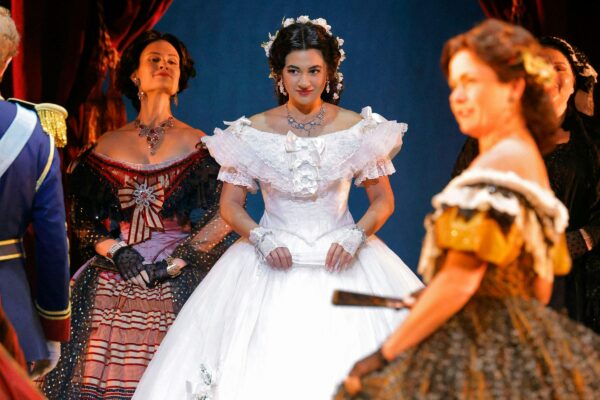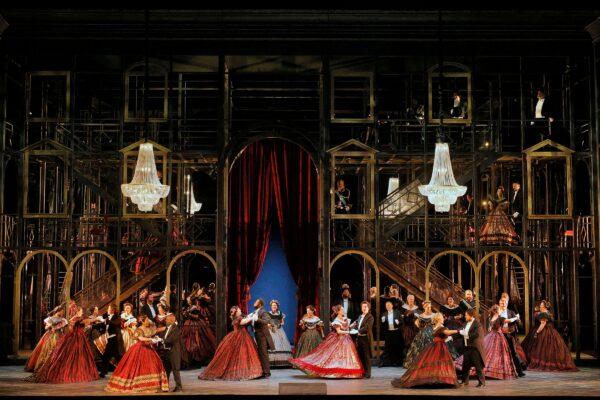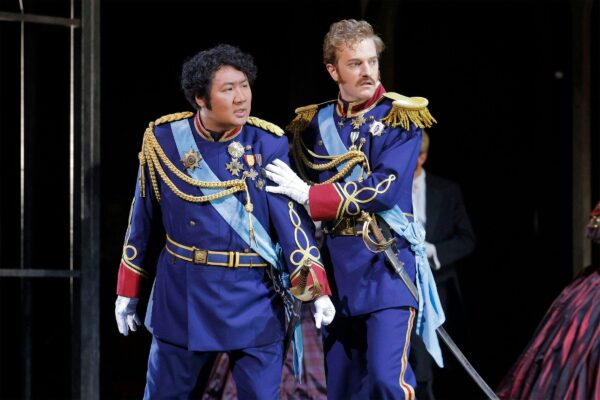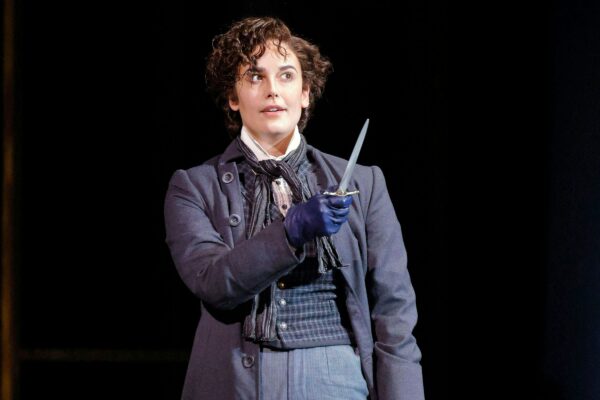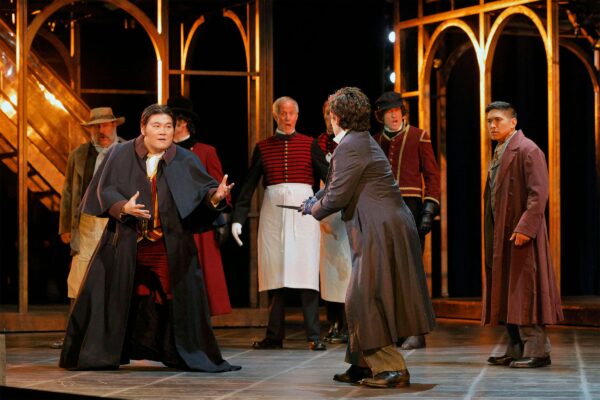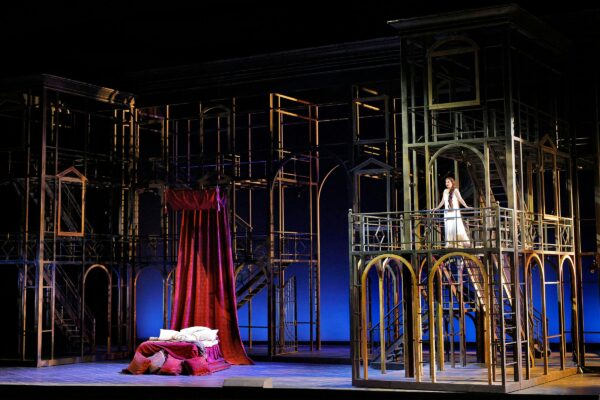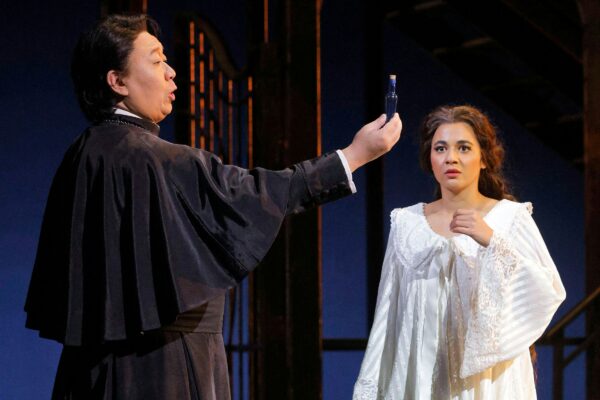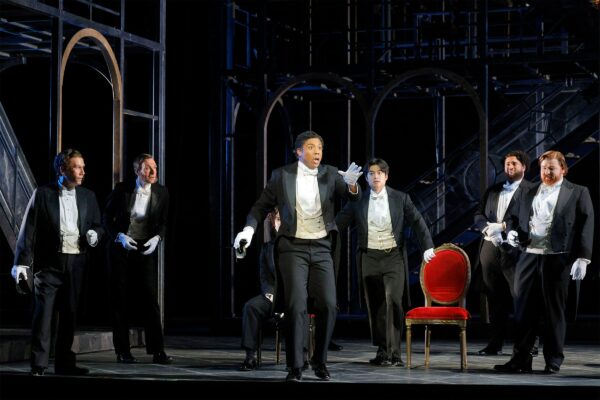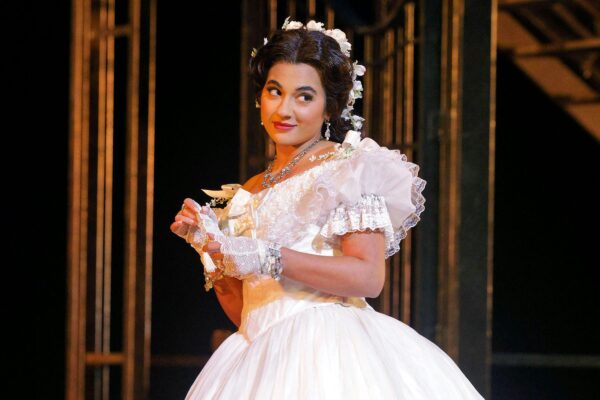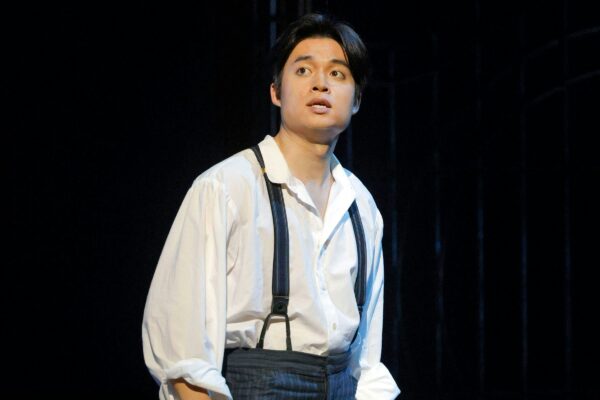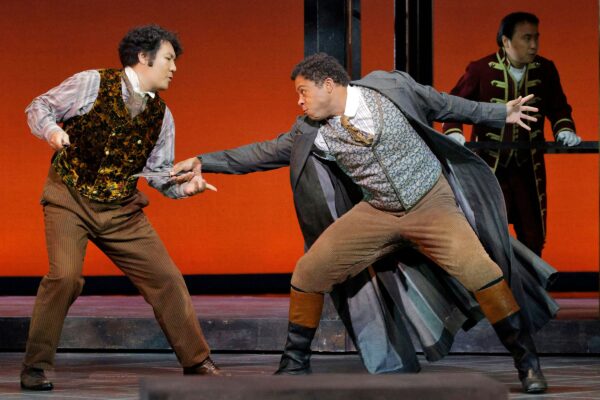The Los Angeles Opera‘s revival of Gounod‘s Roméo et Juliette dazzled in its opening performance last night, thanks to extraordinary vocal performances and masterful conducting. With Amina Edris and Duke Kim delivering passionate portrayals of the star-crossed lovers, and Domingo Hindoyan leading the orchestra in a lush, romantic interpretation of Gounod’s score, the evening was a triumph.
Roméo et Juliette is an opera steeped in history, marking its place as one of the most enduring adaptations of Shakespeare’s timeless tragedy. Premiering in Paris in 1867, the opera was composed after Gounod’s success with Faust, another literary adaptation, and quickly became one of his most celebrated works. With a libretto by Jules Barbier and Michel Carré, the opera capitalized on the popularity of Shakespeare’s play, which had only gained wide recognition in France in the preceding decades. Roméo et Juliette was an instant success at the Théatre Lyrique, praised for its melodic beauty and emotional depth. Over time, the opera became a staple of the French operatic repertoire, beloved for its lyrical charm and romantic intensity.
What sets Roméo et Juliette apart from Shakespeare’s original play is its focus on the love story, with much of the political and familial conflict of the source material pared down. The opera, unlike the play, eliminates many of the subplots and supporting characters to center the narrative almost entirely on the doomed romance between the two protagonists. In the most notable departure from Shakespeare’s version, Gounod and his librettists modify the ending: in the opera, Juliet awakens in the tomb while Romeo is still alive, allowing for a final, heartbreaking duet. This alteration, common in the tradition of French grand opera, heightens the emotional impact of the finale, giving audiences a prolonged moment of tragic beauty before the inevitable conclusion.
This focus on love and tragedy is one reason Roméo et Juliette is considered by many critics to be a masterpiece. Gounod’s score brims with lyrical elegance, infusing the story with the kind of sweeping romanticism that only opera can fully realize. The opera’s structure, with its series of beautifully crafted arias, duets, and ensembles, provides a musical and emotional arc that perfectly matches the intensity of the narrative. Critics have long admired the way Gounod captures the essence of youthful love, while imbuing the score with an aching sense of inevitability that makes the final scenes all the more devastating. It is in this seamless fusion of music and drama that Roméo et Juliette attains its status as a masterpiece of French opera.
Amina Edris, as Juliet, brought a level of vocal brilliance that can only be described as otherworldly. Her soprano soared effortlessly, radiating warmth and purity, capturing Juliet’s journey from youthful exuberance to heart-wrenching tragedy with a skill that left no emotional stone unturned. Edris’s rendition of the famous aria “Je veux vivre” was a standout, her voice glittering with the joy of first love, while later scenes saw her tone darken with grief and desperation, leaving me breathless with her range and depth. It was a performance not just of technical mastery, but of true artistry.
Duke Kim, as Romeo, was her equal in every way. His Romeo was not merely a romantic hero, but a deeply human figure, vulnerable and earnest. Kim’s voice — rich, supple, and powerful — brought Romeo’s passions to life with vivid immediacy. His “Ah! lève-toi soleil!” was a highlight of the evening, sung with such longing that it seemed to hang in the air, shimmering with the weight of Romeo’s hope and despair. Kim’s chemistry with Edris was palpable, their duets smoldering with passion and tenderness, making their tragic fate even more poignant.
Justin Austin‘s Mercutio provided a delightful contrast to the lovers’ intense romance, delivering the famous “Queen Mab” ballade with sparkling wit and bravado. Yet, Austin imbued Mercutio with a depth that hinted at the character’s inevitable demise, adding nuance to what could easily have been a lighter, comedic role. His voice, robust and agile, handled the score’s demands with ease.
Craig Colclough as Lord Capulet and Wei Wu as Friar Laurent were equally impressive, their voices adding weight and authority to the supporting roles, while the LA Opera chorus, under Hindoyan’s direction, sang (as well as danced in one scene) with cohesion and emotional power, despite being hindered by the physical constraints of the staging.
And here lies the sole misstep of the evening: the staging. This revival, originally conceived by Royal Shakespeare Company’s Ian Judge and recreated by Kitty McNamee, felt at odds with the emotional intimacy of Gounod’s music. The multi-level scaffolding that dominated the stage seemed cold and cumbersome, reducing the space for the singers to interact naturally. The clunky set transitions were a distraction, with stagehands visibly maneuvering heavy pieces in full view of the audience, interrupting the flow of the narrative. Members of the chorus were frequently marooned on the upper levels of the set, and their descent down the rattling staircases slowed down the scene changes. At times, it felt as though the singers were battling the set as much as they were performing the opera.
Despite these drawbacks, the production’s musical strengths far outweighed the visual challenges. Tim Goodchild‘s costumes are stunning, stunning, stunning. This is his third time designing Roméo et Juliette (the previous were in 2005 and 2011), and this time he creates the privileged classes as they would have appeared when the play first opened — you could see where the American South got their inspiration with the hoop skirts. The greatest moment was the reveal near the beginning where mourners from the prologue go from black garb to party colors in the twirl of a dress.
Domingo Hindoyan’s conducting was nothing short of superb. His interpretation of Gounod’s score was lush and expansive, yet he never allowed the orchestra to overwhelm the singers. Instead, he brought out the intricacies of the music, allowing the emotional arc of the story to unfold with grace and intensity. The urgency of the climactic moments was heightened by his skillful pacing, making the tragedy of Romeo and Juliet’s fate all the more devastating.
If one were to list the candidates for the LA Opera’s next music director (Conlon is retiring in 2025), Hindoyan’s name might well be at the forefront of the conversation. His command of the score and rapport with the orchestra suggest that he would be a formidable contender for the role of music director, should the opportunity arise. Musically, his presence is undeniable, and his ability to bring out the best in both singers and instrumentalists speaks volumes about his potential for leadership. As a Venezuelan with an Armenian mother, his appointment would carry particular significance for LA Opera’s efforts to engage with both its sizable Armenian and Latino communities. (Lina González-Granados takes over conducting duties Nov. 20 -23.)
The extraordinary performances of Edris, Kim, and the rest of the cast, coupled with Hindoyan’s inspired conducting, made this Roméo et Juliette a musical lovefest. Love, as Gounod so achingly conveys, may be fleeting and tragic, but in the hands of this world-class cast, it was a thing of breathtaking beauty.
photos by Cory Weaver
Roméo et Juliette
LA Opera
Dorothy Chandler Pavilion, 135 North Grand Ave.
Conductor (Nov 2-17): Domingo Hindoyan
Conductor (Nov 20-23): Lina González-Granados
3 hours and 10 minutes, including one intermission
in French with English subtitles
remaining performances:
Sunday, Nov 10, 2024, at 2
Thursday, Nov 14, 2024, at 7:30
Sunday, Nov 17, 2024, at 2
Wednesday, Nov 20, 2024, at 7:30
Saturday, Nov 23, 2024, at 7:30 (final performance)
for tickets (beginning at $33.50), call 213. 972.8001 or visit LA Opera
![Post image for Opera Review: ROMEO & JULIET [ROMÉO ET JULIETTE] (Los Angeles Opera)](https://stageandcinema.com/wp-content/uploads/2024/11/romeo-and-juliet-la-opera.png)
